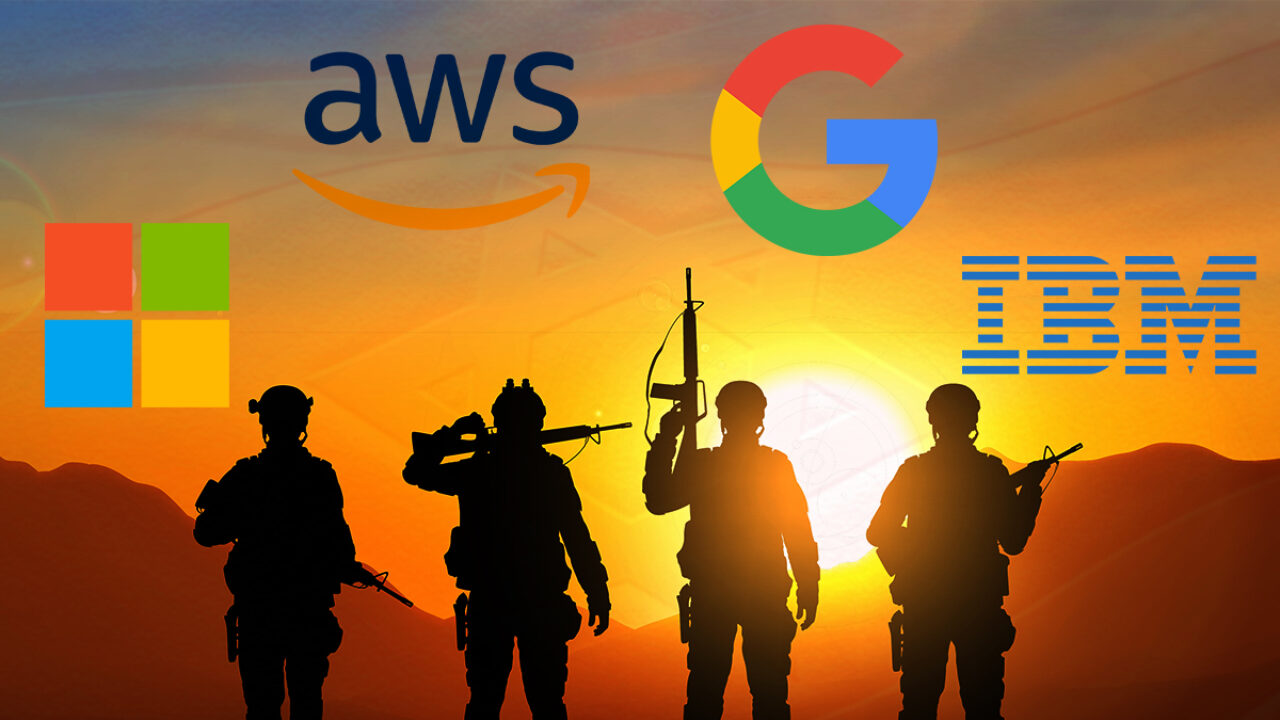The Big Tech Behind Israel’s Digital Apartheid
As they once did in South Africa, U.S. tech companies maintain a system of surveillance and control in Gaza and the West Bank. Graphic by Truthdig.
Graphic by Truthdig.
In recent years, four major human rights organizations have designated Israel an “apartheid state.” The first to do so were two Israeli groups, Yesh Din and B’Tselem, followed in short order by Human Rights Watch and Amnesty International. As with the paradigmatic 20th century apartheid system in South Africa, today’s largest U.S. technology corporations provide the backbone of the tech-driven surveillance state that segregates and subjugates the Palestinian populations of Gaza and the West Bank.
And just as they were in South Africa, the contracts for administering this system are extremely lucrative. The best-known example is Project Nimbus, a cloud services project that supports the Israeli military. The initial $1.2 billion contract awarded in April 2021 to Amazon and Google — who beat out Microsoft, Oracle and IBM — contains clauses that ensure continuity of services in the face of boycott activism, and that allow the Israeli government, including the Israeli Defense Forces, to use the cloud services without any regulation or oversight by the contracted companies. The importance of the latter clause became apparent soon after the contract was announced, when workers at Amazon and Google launched a campaign, No Tech for Apartheid, to demand their employers pull out of Nimbus.
Nimbus gained wider public notice the following July, when The Intercept published documents revealing that “the new cloud would give Israel capabilities for facial detection, automated image categorization, object tracking and even sentiment analysis that claims to assess the emotional content of pictures, speech and writing.” While there appears to be no publicly available information about its actual uses by the Israeli government or defense establishment, experts quoted in the piece raised concerns that Google’s technologies could be used to predict future data, identify emotions from pictures, detect lies and recognize objects. Earlier this month, Forbes reported that Israeli authorities are indeed using Amazon’s facial recognition software, Rekognition, though the scope of its use is unknown.
While Project Nimbus has scooped up most of the attention from activists and the media, it is far from the only tech project aiding and abetting Israeli apartheid.
Since the initial launch of No Tech for Apartheid more than a year ago, the campaign has received the support of over 1,000 Google and Amazon workers, and more than 50 human rights organizations. There have also been several protests. Most recently, Amazon and Google workers on Oct. 10 reaffirmed their commitment to canceling Project Nimbus and their opposition to Israeli policy.
While Project Nimbus has scooped up most of the attention from activists and the media, it is far from the only tech project aiding and abetting Israeli apartheid.
Yarden Katz, a professor of American culture and digital studies at the University of Michigan, has reported on Google’s long relationship with apartheid Israel. In 2013, Google launched E-nnovate, a project that helped the Israeli government develop and implement its surveillance-drenched tech industry. By 2015, Google’s then-CEO Eric Schmidt had invested $18 million in a cybersecurity initiative created by the former chief of Unit 8200, Israel’s counterinsurgency and surveillance unit. And as part of Project Nimbus, Google is assisting Israel in building server farms in Bnei Zion, a Jewish settlement established in 1947.
Amazon and Google are not alone. Katz has also reported on Microsoft’s extensive presence in Israel, beginning with the opening of the company’s first research center in 1991. Israeli Prime Minister Benjamin Netanyahu has said that Israel and Microsoft are “a match made in heaven, but recognized here on earth.” Following Israel’s assault on the West Bank during the Second Intifada, Microsoft put up pro-Israel billboards in Jenin with the words, “The heart says thanks [to] the forces of security and rescue.” During that time period, and over growing activist pressure, Microsoft signed a three-year $35 million contract to provide products to the Israeli defense establishment and partnered with the surveillance firm AnyVision (now called Oosto) to provide real-time facial recognition and other video analytics.
The Israeli army continues to use a range of Microsoft projects across its operations. Xboxes control military tanks; mixed reality goggles “allow soldiers to see through smoke and around corners [and] use holographic imagery for training and have 3D terrain maps projected onto their field of vision at the click of a button”; cloud services support a system of ID permits; and company-designed courses are used to train officers in cybersecurity and artificial intelligence. Microsoft has even sent mentors to an IDF hackathon where developers worked on a “Settlement Defense” app to “assist soldiers guarding Israeli settlements” and a “manual weapon calibration system for shooting training for combat soldiers.”
IBM — a major supplier to South Africa last century — is another facilitator of Israeli apartheid. As Who Profits has reported, “IBM designed and operates the Eitan System of the Israeli Population, Immigration and Border Authority (PIBA), where personal information on the occupied Palestinian and Syrian people collected by Israel, is stored and managed.” Israel uses Eitan to document and control the movement of Palestinians at the main checkpoints. The system is also used for permits needed for work, medical care and family reunification, as well as biometric surveillance. In this way, PIBA’s Eitan system is similar to South Africa’s IBM-powered apartheid registry, passbook and biometric systems, which were used to police the movements and activities of the African population. IBM also provides direct services to Israeli police and military forces.
Project Nimbus is but an especially stark example of the digital colonialism that is part of Big Tech’s DNA.
Other U.S. tech companies that provide Israel with technology, education and investments include Apple, Cisco, Dell, Facebook, Hewlett Packard, Intel, Oracle, Nokia and Nvidia. OpenAI, the Microsoft-backed creator of ChatGPT, is eyeing investment opportunities in the country.
This list is a partial one, based on available public information. Other pieces of Silicon Valley’s relationship to Israeli police and military forces are cloaked behind nondisclosure contracts, making it difficult to get a full picture of who provides which services and for what uses.
The recent global surge of activism in support of the Palestinian struggle has served to highlight its own limits and contradictions. That includes the No Tech For Apartheid campaign. For all its good intentions, No Tech For Apartheid suggests that Big Tech corporations can “do good” if only its workers gain a say in what the companies do. This misses the larger point that Big Tech corporations such as Amazon, Google, Microsoft and IBM are best understood as modern-day East India companies. They colonize the global digital economy and reinforce the unequal exchange and division of labor separating the North and the South. Under the existing Big Tech paradigm, Americans do the high-level “thinking,” take ownership of the core infrastructure and knowledge, and extract rents, while the people of the Global South perform menial labor for pennies. Project Nimbus is but an especially stark example of the digital colonialism that is part of Big Tech’s DNA.
Changing the Big Tech conversation dominated by American and European intellectuals will be difficult. But it can be done. A good place to begin any wider shift is bringing to the fore the critical role U.S. tech plays in maintaining Israeli apartheid.
Your support matters…Independent journalism is under threat and overshadowed by heavily funded mainstream media.
You can help level the playing field. Become a member.
Your tax-deductible contribution keeps us digging beneath the headlines to give you thought-provoking, investigative reporting and analysis that unearths what's really happening- without compromise.
Give today to support our courageous, independent journalists.






You need to be a supporter to comment.
There are currently no responses to this article.
Be the first to respond.